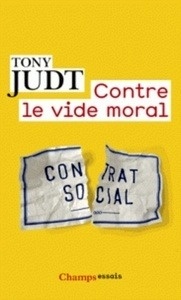Contre le vide moral
Restaurons la social-démocratie

Editorial Libres champs
Fecha de edición octubre 2015 · Edición nº 1
Idioma español
EAN 9782081284517
220 páginas
Libro
Resumen del libro
"J'espère avoir tracé quelques lignes directrices à l'intention de ceux, surtout des jeunes, qui essaient de formuler leurs objections à notre mode de vie. Mais cela ne suffit pas. En tant que citoyens d'une société libre, nous avons le devoir de jeter un oeil critique sur notre monde. Et si nous pensons savoir ce qui ne va pas, encore faut-il agir en conséquence. Les philosophes, suivant un mot célèbre, se sont contentés d'interpréter le monde de diverses manières ; il s'agit aujourd'hui de le changer".
Livre-manifeste, Contre le vide moral fournit les outils indispensables à l'élaboration d'une nouvelle forme de gouvernance. Fervent défenseur de l'héritage de la social-démocratie, Tony Judt y clame la nécessité de repenser l'Etat et en prône un rôle accru, qui ne menacerait pas nos libertés. En déplorant l'absence de considérations éthiques dans le débat public, il incite les prochaines générations à retrouver le sens du politique.
Un testament intellectuel fulgurant et optimiste.
Biografía del autor
x{0026}lt;P x{0026}lt;B Tony Judt x{0026}lt;/B (Londres, 1948-Nueva York, 2010) realizó sus estudios en el King's College de Cambridge y en la École Normale Supérieure de París. Impartió clases en las universidades de Cambridge, Oxford, Berkeley y Nueva York, y en esta última ocupó la cátedra de Estudios Europeos, que él mismo fundó en 1995, y fue director del Remarque Institute. Entre sus publicaciones cabe destacar x{0026}lt;I El peso de la responsabilidadx{0026}lt;/I (Taurus, 2014), x{0026}lt;I ¿Una gran ilusión?x{0026}lt;/I (Taurus, 2013), x{0026}lt;I Pensar el siglo XXx{0026}lt;/I (Taurus, 2012), x{0026}lt;I El refugio de la memoriax{0026}lt;/I (Taurus, 2011), x{0026}lt;I Algo va malx{0026}lt;/I (Taurus, 2010), x{0026}lt;I Sobre el olvidado siglo XX x{0026}lt;/I (Taurus, 2008), x{0026}lt;I Pasado imperfectox{0026}lt;/I (Taurus, 2007), x{0026}lt;I Postguerrax{0026}lt;/I (Taurus, 2006), considerado uno de los diez mejores libros de 2005 por la x{0026}lt;I New York Times Book Reviewx{0026}lt;/I , galardonado con el Premio Council on Foreign Relations Arthur Ross y finalista del premio Pulitzer, y x{0026}lt;I Cuando los hechos cambianx{0026}lt;/I (Taurus, 2015). Judt colaboró en diferentes medios de Europa y Estados Unidos, como x{0026}lt;I The New York Review of Booksx{0026}lt;/I , el x{0026}lt;I Times Literary Supplementx{0026}lt;/I o x{0026}lt;I The New York Timesx{0026}lt;/I . En 2007 recibió el Premio Hannah Arendt, y en 2009 el Orwell Prize for Lifetime Achievement. Falleció en agosto de 2010 a causa de una enfermedad degenerativa.x{0026}lt;/P








